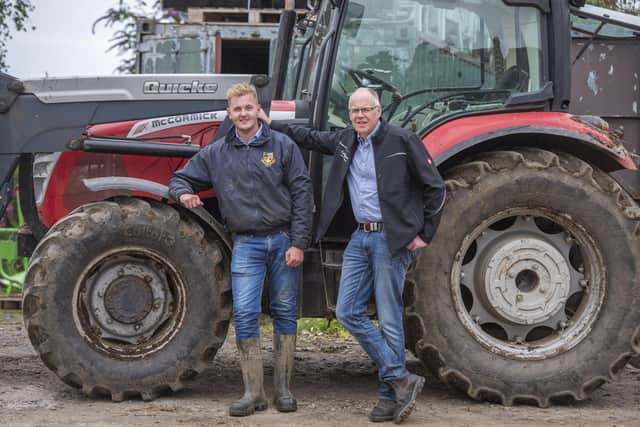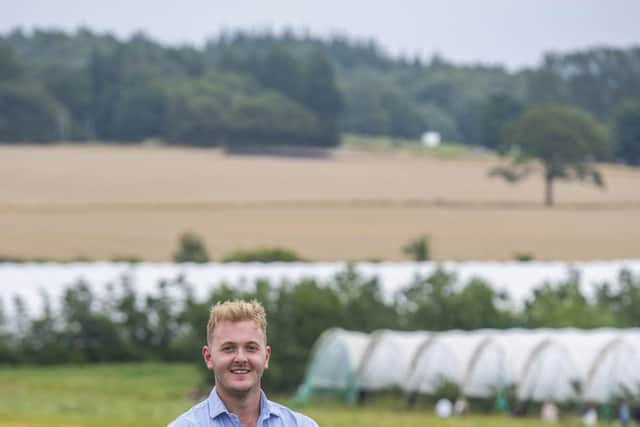Scottish farming: Young farmer urges people to combat misinformation about agriculture by visiting farms
A young Scottish farmer has spoken about his concern over how easily misinformed posts on the internet about the agriculture sector in Scotland spread “like wildfire”, encouraging a generation of maleducated people on farming.
George Sinclair runs the 260-acre Craigie’s Farm with his family in South Queensferry, which is home to some 200 breeding ewes, Highland cows, pigs and poultry. His father John used to work as a contractor growing potatoes, while past Sinclair generations ran a dairy farm.
Advertisement
Hide AdAdvertisement
Hide AdBut now, in its fifth generation in the family, the farm has a focus on self-sustainability and accommodates members of the public for tours and a space to “pick your own”, while learning about local produce.


In a bid to dispel misinformation, the 25-year-old hosts educational days at the premises for families, schools and whoever is interested in learning a bit more about farming. They sometimes welcome up to 2,500 people a day during the summer.
Mr Sinclair said: "All you need to do is pick up a phone and you can read some misinformation, which then gives you a skewed view of farming.
"I don’t blame people for seeing it. There’s a lot of misinformation spreading all over the internet like wildfire, but we need to improve how people can access better information, and that can start with encouraging people to visit farms to see what some of us are doing.”


Mr Sinclair, who studied rural business and worked on multiple farms in Australia, said he doesn’t deny there is malpractice in the agriculture industry around the globe. But he insisted all farming should not be tarred with the same brush.
“There are so many regulations in Scotland that we have to follow for animal welfare,” he said. "It makes it tough for farmers when it comes to production, but it’s really good for the welfare aspect, and people need to know this.”
On Craigie’s farm, some of the animal welfare lessons the Sinclair family teach is sheep shearing. "Sometimes during demonstrations I can hear people visiting whisper ‘oh my God, that’s so cruel’,” Mr Sinclair said.
"But then we explain why we do it, particularly at this time of year when it’s really muggy and the flies lay their eggs in the wool, which can be devastating for the sheep.” Flystrike, which Mr Sinclair is referring to, is a condition where maggots hatch in the wool and start eating the sheep.
Advertisement
Hide AdAdvertisement
Hide Ad"Then you have people respond saying ‘now they get it’, which is rewarding,” he said. "There will always be people who don’t agree, but you just need to do what you can.”
As well as farm welfare conditions, Mr Sinclair said they also educated on food air miles – the fossil fuels burned to transport goods.
"We try and encourage people to look at labels and see where the food that they’re buying comes from,” he said.
"It’s heart-breaking to see when farmers in this country are doing a lot to maintain good welfare standards and good quality food and you see supermarkets buying meat from abroad from mass produced farms and selling it cheap.
"We need people to support local farmers and buy local rather than from countries thousands of miles away. We have the capability to produce enough for food this country."
The Sinclairs have a farm shop on-site selling fruit, vegetables and meat grown and reared “within a mile” of the counter. "I know not everyone can afford to buy locally sourced meat from a butcher, but the quality of meat is directly linked to the welfare of the animals reared,” he said.
The young farmer said the root of tackling misinformation boils down to education. As well as farm trips, he said there should be more effort in schools to teach about nutrition and where food comes from.
"Sometimes I ask kids coming here ‘so where do you think bacon and sausages come from?’ And they respond with ‘the ground’ or ‘the supermarket shelf’.
Advertisement
Hide AdAdvertisement
Hide Ad"Lots of kids do know about food, but there are some who really don’t, which is concern given it is part of every day life.” And his response to concern about agriculture’s contribution to greenhouse gases?
"A lot of the industry in this country is working really, really hard to do what it can to make food and to reduce emissions,” he said. "There are changes being made every day, and these should be recognised. It’s not something that changes overnight.”
A school’s response to Craigies
Grace McClelland, a class teacher at Frogston Primary School in Edinburgh, visited Craigies last month with P3 pupils.
The school encourages child-led learning. She said her pupils chose to learn about where food comes from.
Ms McClelland said the visit involved discussions about what the animals could produce such as, wool, milk, eggs, and meat.
"Children benefit from seeing and experiencing things first hand as they can refer to these experiences when accessing information,” she said.
"With farming, some of the pupils felt detached when talking about where our food comes from. After visiting the farm, they can link their experience to other related topics such as plant life cycles and sustainability.”
The teacher added: “As an educator, it is important to encourage critical thinking when engaging with any information and this includes information online. By starting conversations at a young age about food production and providing a safe space in the classroom to be critical thinkers, pupils will hopefully develop a well-rounded view. It helps to see the farm in person.”
Advertisement
Hide AdAdvertisement
Hide AdWhat is Scotland’s current take on farm animal welfare?
Rural affairs secretary Mairi Gougeon announced last month that by 2025, farmers and crofters will have to meet conditions of a new animal health and welfare declaration to be eligible for payments.
In a recent consultation on the coming Agriculture Bill for Scotland, which had about 400 responses, some respondents argued existing welfare standards in Scotland were very high and covered by Assurance schemes – voluntary schemes which establish production standards covering food safety, animal welfare and environmental protection.
These respondents said “there is no need to duplicate efforts or create a problem that doesn’t exist”.
Others, however, said existing minimum standards were entirely insufficient, justifying the inclusion of new standards in the Bill.
Former National Farmers Union vice-president and farmer Gwyn Jones, who sits on the Defra Farm Animal Welfare Board for England, said last year that farm animal welfare in the UK was some of the best in the world, but acknowledged this was only if farmers abided by existing rules.
Research by Animal Equality, a group campaigning to end the abuse of farmed animals, found fewer than 3 per cent of the UK’s 300,000 farms were inspected during a four-year period from 2016 to 2021, leading to “widespread non-compliance” with animal protection laws.
Comments
Want to join the conversation? Please or to comment on this article.
